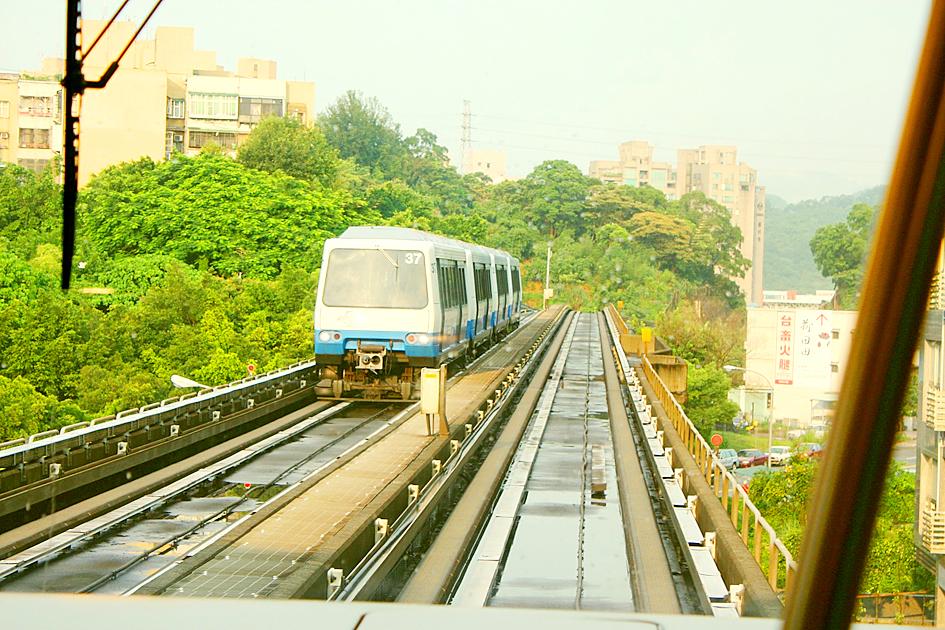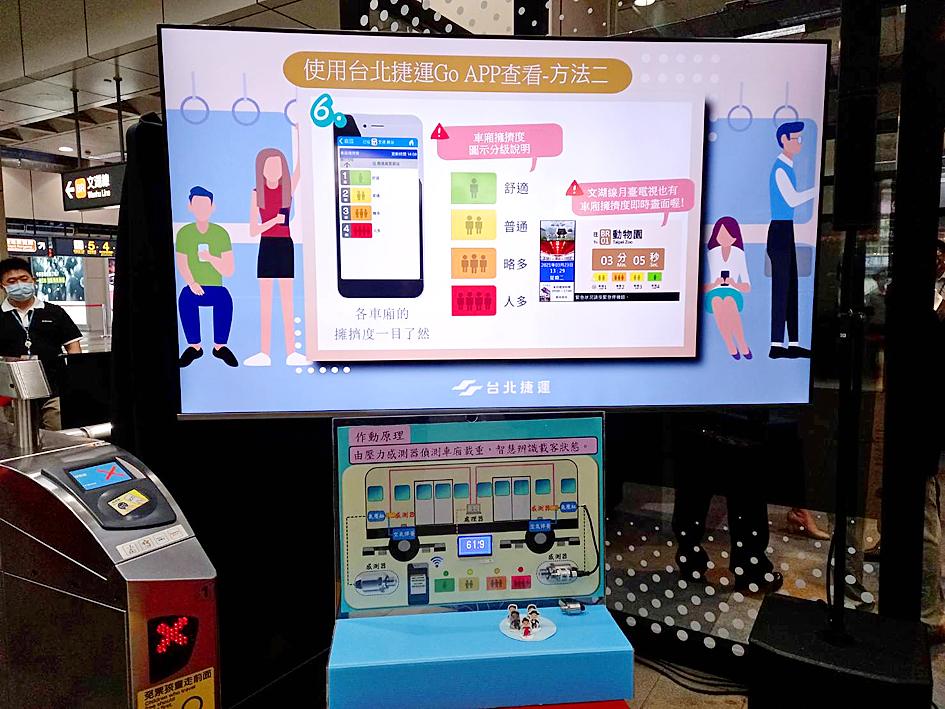Passengers of Taipei MRT System’s Wenhu Line (Brown Line) can check how crowded the carriages are using the Taipei MRT app, as well as displays in the stations, Taipei Rapid Transit Corp (TRTC) said yesterday.
The company has made the service available on the busiest MRT Line after testing it for one year on the Bannan Line (Blue Line). It is also offering it at a time when the nation has seen a rise in local COVID-19 cases.
A survey conducted by TRTC in 2016 identified the 10 most crowded sections of MRT lines during peak hours, nine of which were on the Brown Line. The most busy section on the list was between Zhongxiao Fuxing and Nanjing Fuxing stations.

Photo courtesy of Chinatrust Real Estate Co
From 8am to 9am, an average of 4.07 people stood within 1m2 on trains from Zhongxiao Fuxing to Nanjing Fuxing, the survey showed.
Between 6pm and 7pm, trains from Nanjing Fuxing to Zhongxiao Fuxing stations had an average of 3.96 people standing in 1m2, the survey showed.
The company said that its self-developed alert system uses four levels to indicate how crowded carriages are: green means passengers can move inside carriages without any trouble; yellow means passengers can move easily inside carriages; orange means carriages are slightly crowded and passengers need to turn sideways to pass each other; and red means carriages are very crowded and it is difficult for passengers to move around.

Photo: Tsai Szu-pei, Taipei Times
By next year, the service would also be available for passengers on Tamsui-Xinyi Line (Red Line), Songshan-Xindian Line (Green Line) and the Zhonghe-Xinlu Line (Orange Line), TRTC said.
In other news, people at Zhongxiao Fuxing Station can now wait for a train at “Metro Corner,” where they can watch updates of MRT services, weather reports and breaking news, the company said.
The corner also has an automatic coffee machine and a vending machine, which allow people to pay using cash or mobile payments, it added.

The Grand Hotel Taipei on Saturday confirmed that its information system had been illegally accessed and expressed its deepest apologies for the concern it has caused its customers, adding that the issue is being investigated by the Ministry of Justice Investigation Bureau. The hotel said that on Tuesday last week, it had discovered an external illegal intrusion into its information system. An initial digital forensic investigation confirmed that parts of the system had been accessed, it said, adding that the possibility that some customer data were stolen and leaked could not be ruled out. The actual scope and content of the affected data

‘LIKE-MINDED PARTNER’: Tako van Popta said it would be inappropriate to delay signing the deal with Taiwan because of China, adding he would promote the issue Canadian senators have stressed Taiwan’s importance for international trade and expressed enthusiasm for ensuring the Taiwan-Canada trade cooperation framework agreement is implemented this year. Representative to Canada Harry Tseng (曾厚仁) in an interview with the Central News Agency (CNA) said he was increasingly uneasy about Ottawa’s delays in signing the agreement, especially as Ottawa has warmed toward Beijing. There are “no negotiations left. Not only [is it] initialed, we have three versions of the text ready: English, French and Mandarin,” Tseng said. “That tells you how close we are to the final signature.” Tseng said that he hoped Canadian Prime Minister Mark Carney

POSITIVE DEVELOPMENT: Japan and the US are expected to hold in-depth discussions on Taiwan-related issues during the meeting next month, Japanese sources said The holding of a Japan-US leaders’ meeting ahead of US President Donald Trump’s visit to China is positive news for Taiwan, former Japan-Taiwan Exchange Association representative Hiroyasu Izumi said yesterday. After the Liberal Democratic Party’s landslide victory in Japan’s House of Representatives election, Japanese Prime Minister Sanae Takaichi is scheduled to visit the US next month, where she is to meet with Trump ahead of the US president’s planned visit to China from March 31 to April 2 for a meeting with Chinese President Xi Jinping (習近平). Japan and the US are expected to hold in-depth discussions on Taiwan-related issues during the

President William Lai (賴清德) yesterday bestowed one of Taiwan’s highest honors on Saint Vincent and the Grenadines (SVG) Ambassador Andrea Clare Bowman in recognition of her contributions to bilateral ties. “By conferring the Order of Brilliant Star with Grand Cordon on Ambassador Bowman today, I want to sincerely thank her, on behalf of the Taiwanese people, for her outstanding contribution to deepening diplomatic ties between Taiwan and SVG,” Lai said at a ceremony held at the Presidential Office in Taipei. He noted that Bowman became SVG’s first ambassador to Taiwan in 2019 and